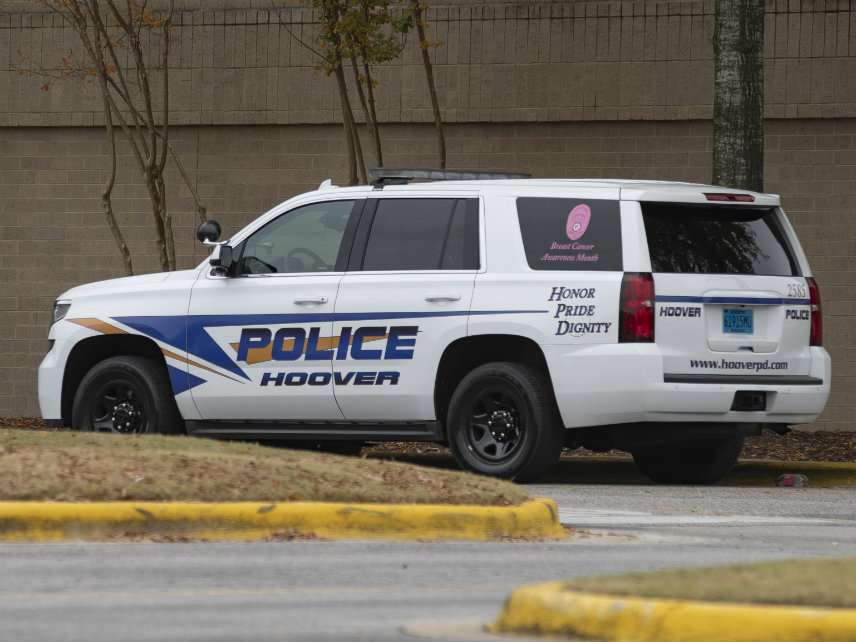Do Alabama Police Who Killed the Wrong Man Know What 'Brandished' Means?
Emantic Bradford Jr. may have had a gun. But he didn't deserve to die.

Police in Hoover, Alabama, are still trying to get their story straight days after an officer shot and killed the wrong man at a mall last week.
It's still unclear what exactly happened on Thanksgiving night that led police working security to shoot and kill Emantic "EJ" Bradford Jr. There was a prior shooting that injured two people, though police now say Bradford was probably not responsible. Still, Bradford was shot and killed by an officer who saw him holding a gun. While all the facts have yet to come out, the Hoover Police Department's seemingly ever-changing explanations haven't helped clear things up.
In a joint statement sent to media outlets yesterday morning, the police department and the city of Hoover claimed "with certainty" that "Bradford brandished a gun during the seconds following the gunshots, which instantly heightened the sense of threat to approaching police officers responding to the chaotic scene." As the Associated Press noted, the statement seems to suggest Bradford shouldn't have pulled out his gun at all, even though his father claims Bradford had a permit for the handgun. Alabama is also an open carry state.
Later yesterday, police posted an update to Facebook "to clarify" their use of "brandish." That word "was used because Mr. Bradford had a gun in his hand as police officers responded to the active shooter situation between mall patrons," police said.
Of course, there's a big difference between brandishing a gun and simply holding it in one's hand. According to the Cambridge Dictionary, "brandish" means: "to wave something in the air in a threatening or excited way." Dictionary.com's definition—"to shake or wave, as a weapon; flourish"—is a little less specific. Still the threatening connotation is the same.
In Bradford's case, authorities have yet to reveal evidence suggesting he posed a threat to police or innocent bystanders. In fact, Ben Crump, an attorney for Bradford's family, said at a press conference Sunday that witnesses have claimed Bradford was attempting to help people in the midst of the chaos following the original shooting, only to be shot "within milliseconds" and without a verbal warning from the officer who opened fire. Bradford "was trying to be somebody who helped save people, yet he was killed," Crump said.
There's been significant confusion regarding this case from the beginning. It all started late Thursday night at the Riverchase Galleria in Hoover, where thousands of people were kicking off the holiday shopping season. The scene turned chaotic when a gunman opened fire, injuring an 18-year-old man and a 12-year-old girl. At some point, Bradford took his gun out. He may not have been the only one, as AL.com reported Thursday that "several shoppers were seen with their guns drawn."
Bradford was quickly shot by police. According to The Washington Post:
"While moving toward the shooting scene, one of the officers encountered a suspect brandishing a pistol and shot him," police said in a statement written immediately after the shooting. In a revised statement, they said Bradford was fatally shot while "fleeing the shooting scene while brandishing a handgun."
At first, police said they had apprehended the right suspect. But on Saturday they admitted "that while Mr. Bradford may have been involved in some aspect of the altercation, he likely did not fire the rounds that injured the 18-year-old victim." The 12-year-old who was shot is believed to have been an "innocent bystander," police said.
The investigation into the shooting, as well as the search for the real gunman, is now in the hands of the Alabama Law Enforcement Agency (ALEA). Hopefully, we'll soon get a clear picture of what happened that night.
That said, the death of Bradford, who was black, brings to mind a similar police shooting that took place just weeks ago. As Reason's Robby Soave reported earlier this month, an armed security guard at a bar in Chicago returned fire on an active shooter and eventually pinned him to the ground. But the guard who, like Bradford, was black, was shot and killed when police arrived on the scene and thought he was the bad guy.
In both cases, it's important not to make final conclusions until all the facts come out. But this much is clear: Neither man deserved to die. If witnesses are to be believed, both appear to have been the proverbial "good guy with a gun." The fact that police shot first and asked questions later just makes their deaths all the more tragic.


Show Comments (92)